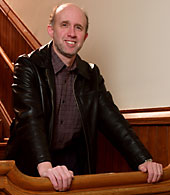ABC
News Seeks Advice of SSW Prof
 ABC
News sought the opinion of Josh Miller, professor in the
Smith College School for Social Work, before deciding to
air the disturbing videos made by Virginia Tech shooter Cho
Seung-Hui. ABC News producer, Smith alumna Amy Malick ’90,
wanted input from Miller and other mental health experts
to aid the station in determining whether or not to air the
videos. ABC
News sought the opinion of Josh Miller, professor in the
Smith College School for Social Work, before deciding to
air the disturbing videos made by Virginia Tech shooter Cho
Seung-Hui. ABC News producer, Smith alumna Amy Malick ’90,
wanted input from Miller and other mental health experts
to aid the station in determining whether or not to air the
videos.
Malick’s questions were
pertinent -- indeed the very quandary has been fodder for
news coverage. See:
NEW YORK TIMES, April 20, 2007
NEW YORK TIMES, April 19, 2007
Meanwhile, read the email Q&A
that took place between Malick and Miller:
ABC News: Do you think the videos should have been aired
at all? What are the psychological costs vs. benefits?
Josh Miller: Yes,
I think that it is better to air them rather than keep them
secret. They would have otherwise become part of the underground
folklore and probably somehow ended up on YouTube. As distressing
as they are, I think that it is better for people to see
the real thing and then to be able to process it. Many videos
exist of heinous people, such as Hitler and Stalin, or interviews
with people like Ted Bundy. Airing the video will be very
distressing for many people and some will feel very angry
that it is being shown. But, it is the terrible acts that
[Cho Seung-Hui] committed that are distressing, and in some
ways one of the main tasks of recovery and grieving is to
construct a narrative that helps us to understand not only
what happened but, potentially why it happened. As inchoate
as the video is, it offers some clues to the distorted and
tormented state of the killer, which can help with the process
of recovery.
ABC News: Now that they have aired, what limitations do
you think broadcasters should follow in re-airing them?
Miller: I think that there should be limited airing because
repetitive viewing of this is mind-numbing and keeps reminding
people of a very emotionally charged event, which makes it
harder for them to be able to move on and reconnect with
other parts of their lives. I also think that parents should
try to protect their children from seeing the video.
ABC News: What concerns might you have on the effects of
these videos on people who have psychiatric or behavioral
issues?
Miller: I may be wrong, but I think that the fantasy that
people with psychiatric or behavioral issues have about what
the killer was like and what was going through his mind at
the time may be just as destabilizing as seeing the video.
There is no question that this terrible tragedy, like many
before it, will be provocative and challenging for vulnerable
people, some of whom will act in a way that is threatening
or dangerous to themselves or others. I am not convinced
that careful, controlled showing of the video will overly
exacerbate this situation.
ABC News: Some mental
health workers disagree with airing the video.
Miller: I think that these are complex issues and that reasonable
people will disagree, particularly as we all try to make
sense of what happened and how best to help people recover
from this trauma-inducing event. I based my answers on my
experiences as a disaster mental health worker and my sense
that the unknown and fantasy are sometimes more frightening
than reality for people who have survived or encountered
a disaster. At a time like this, I think that it is most
helpful if those of us who have expertise and experience
in responding to violence and disasters respectfully confer
and discuss these issues, exploring different options, rather
than have polarizing, emotional debates. |























